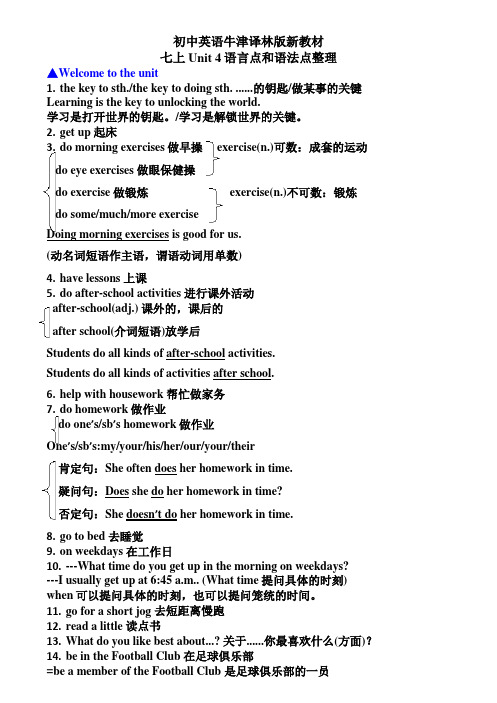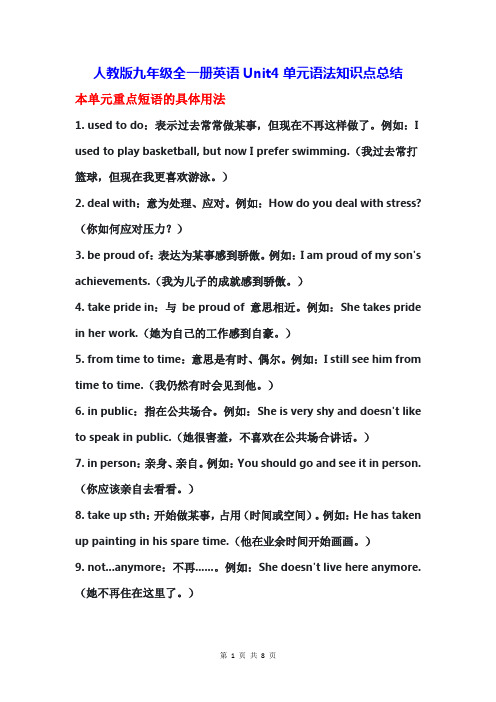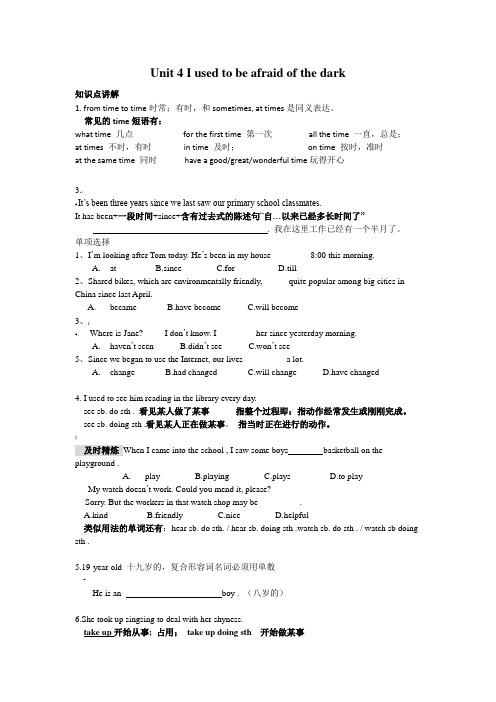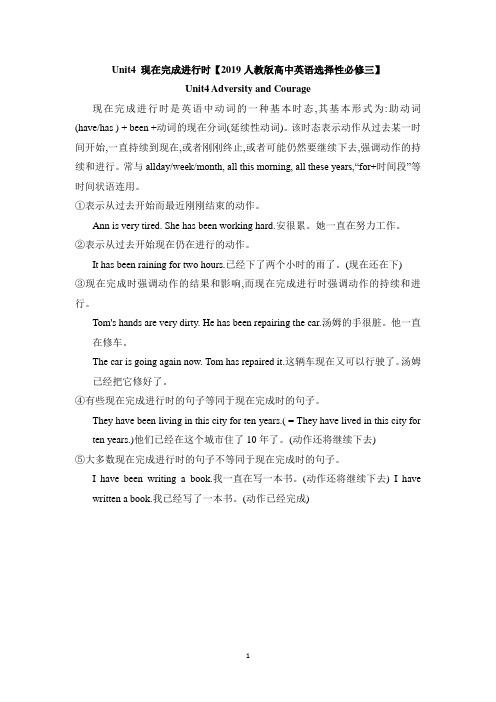unit4语法点3
仁爱英语七年级上册U4T3知识点

仁爱英语七年级上册U4T3知识点在仁爱英语七年级上册的第四单元第三课,我们学习了一些重要的知识点。
这些知识点是我们学好英语的基础,所以我们要认真学习和掌握。
下面是这些知识点的详细介绍。
1. 动词的时态
在英语中,动词的时态分为三种:现在时、过去时和将来时。
现在时表示现在正在进行或经常发生的事情;过去时表示过去已经发生过的事情;将来时则表示将来将要发生的事情。
我们要学会根据句子的语境和时态去使用正确的动词时态。
2. 数词的用法
数词在英语中有两种,分别是基数词和序数词。
基数词用于表示数量,而序数词则用于表示顺序。
我们要根据具体情况正确地使用这两种数词。
3. 形容词的比较级和最高级
形容词的比较级和最高级分别用于表示两个或多个事物之间的比较和最高程度。
比较级通常使用“-er”或“more”来构成,而最高级则使用“-est”或“most”来构成。
4. 祈使句的用法
祈使句用于表示请求、命令等,这种句子的语气比较强硬。
我们要熟练掌握祈使句的用法,根据具体情况正确地使用祈使句。
5. 代词的用法
代词是用来代替名词的,常见的代词有人称代词、指示代词和不定代词等。
我们要认真学习代词的用法,熟练掌握它们的用法和区别。
6. 物主代词的用法
物主代词是用来表示所属关系的,常见的物主代词有“my”、“your”、“his”、“her”等。
我们要认真学习物主代词的用法,熟练掌握它们的用法和区别。
以上就是本课的重点知识点,我们要认真学习和掌握。
只有强化基础,才能在英语学习的道路上越走越远。
Unit4重点知识清单(含语法梳理it形式主语和形式宾语)牛津深圳版英语九年级下册

1.【melt v.(使)融化、熔化,融入,软化】→v. ~s, melted, ~ing→melter n.熔化器;熔炼工2.【flood v.淹没n. 洪水】→v. ~s, flooded, ~ing →flooded adj.洪水淹没的3.【badly adv.严重地;厉害地;恶劣地】→bad adj.坏的→比:worse, worst4.【coach n.教练;长途汽车;旅客车厢;四轮大马车v.训练;指导】→pl. coaches →v. coaches, ~ed, ~ing5.【pass v.&n.通过;及格;传递】→v. passes, ~ed, ~ing→passer n.旅客;过路人;合格者6.【dead adj.不转动的;无生命的;死亡的】→deadly adj.致命的;非常的→die v.死亡;消失→v. ~s, died, dying →death n.死亡→dying adj.临终的;垂死的7.【boss n.老板】→pl. bosses8.【stare v.凝视;盯着看】→v. ~s, stared, staring9.【notice v.注意到;通知n.通知;告示】→pl. ~s →v. ~s, noticed, noticing10.【awake v.(使)醒来adj.醒着的】→v. ~s, awoke/awoken, awaking11.【immediately adv.立刻;马上】→immediate adj.立刻的;紧迫的12.【missing adj.失踪的;缺少的】→miss v.漏掉;错过;想念n.小姐→v. misses, ~ed, ~ing →n.pl. misses13.【fellow n.小伙子;家伙adj.同类的;同伴的】→n.pl. fellows14.【sit v.坐下;使坐下】→v. ~s, sat/sat, sitting15.【seat n.座位v.使就座】→n.pl. ~s →v. ~s, ~ed, ~ing16.【fall v.落下;掉落;减少;下降n.瀑布;秋天】→v. ~s, fell/fallen, ~ing →n.pl. ~s17.【survival n.幸存;幸存者;生存】→survive v.幸存语法要点:【it 作形式主语、形式宾语】1.【it 作形式主语】→It’s difficult for a foreigner to learn Chinese. 【It is +adj. (+for sb) to do sth.】→It was foolish of him to give up the job. 【It is +adj.+of sb +to do sth.】→It’s a pity to miss such an important lecture.【It is +a pity/a shame/a fact/an honor/no wonder+to do sth.】→It seems/appears that he has caught a cold.→It’s reported that three people were badly hurt. 【It is +v.过分(said, believed, ...) +that从句】→It took us three days to plete the speech. 【It takes sb +时间+to do sth.】→It’s time have breakfast.=It’s time for breakfast. 【It is time (for sb) to do sth./It is time for sth.】→It’s two years since he lived in Shenzhen. 【It is +时间段+since从句(过去式)】2.【it 作形式宾语:v.(think, believe, find, consider, suppose, regard) +it+adj./n.+ to to /that从句】→Our teacher makes it a rule never to talk in class. 我们老师立下一个规矩,课上不讲话。
牛津译林版七年级上册(2024)Unit 4 School day 语言点和语法点整理

初中英语牛津译林版新教材七上Unit 4语言点和语法点整理▲Welcome to the unit1.the key to sth./the key to doing sth. ......的钥匙/做某事的关键Learning is the key to unlocking the world.学习是打开世界的钥匙。
/学习是解锁世界的关键。
2.get up 起床3.do morning exercises做早操 exercise(n.)可数:成套的运动 do eye exercises 做眼保健操do exercise 做锻炼 exercise(n.)不可数:锻炼do some/much/more exerciseDoing morning exercises is good for us.(动名词短语作主语,谓语动词用单数)4.have lessons 上课5.do after-school activities 进行课外活动after-school(adj.) 课外的,课后的after school(介词短语)放学后Students do all kinds of after-school activities.Students do all kinds of activities after school.6.help with housework 帮忙做家务7.do homework做作业do one’s/sb’s homework做作业One’s/sb’s:my/your/his/her/our/your/their肯定句:She often does her homework in time.疑问句:Does she do her homework in time?否定句:She doesn’t do her homework in time.8.go to bed 去睡觉9.on weekdays 在工作日10.---What time do you get up in the morning on weekdays?---I usually get up at 6:45 a.m.. (What time提问具体的时刻) when可以提问具体的时刻,也可以提问笼统的时间。
牛津深圳版英语八年级上册 Unit 4-第3课时 语法

(make)maps. They also help
countries to see where they can find oil 3.
or
gold.
The 4. sesceocnondd (two)kind of satellites is used to guide
ships and planes. A ship or a plane can send 5. a a message to the satellite. Then the satellite can find 6. outout
can move by 4. thetmhesmelsveelsves (they).
The company shows its new invention on a video. On
5. ththee
video, people are sitting in a row of chairs,
6. anadnd
(描述年龄) oollddeerr /
old
(描述辈分) elder
(描述距离)ffaarrtthheerr /
far
(抽象含义)ffuurrtthheerr
oldoelsdtest eledldesetst ffaarrtthheesst t ffuurrtthheesstt
二、同义句转换。
He is 14 years old. His friend is 12 years old.
free when they are waiting.
The new system of self-driving 3 . chairs chairs
(chair)can detect(探测)when someone at the front of the queue is called. The chairs look as comfortable as normal ones and they
人教版七下英语unit4语法知识点

人教版七下英语unit4语法知识
点
wear v.穿着:戴着(状态)接衣帽、饰物等 wear a
skirt/hat/watch wear masks戴口罩 wear a smile面带微笑put on穿上;戴上(动作) Put on your sweater!穿上你的毛衣!
Section A
important adj.重要的 it s important for sb.to do sth.做某事对某人来说是重要的 It's very important for us to wear masks now.现在戴口罩对我们来说是非常重要的。
importance n.重要性 the importance of health健康的重
要性
quiet adj.形容词安静的(修饰n.或放be/系动词后)
quite adv.副词很,非常(相当于very) be quiet/keep quiet/stay保持安静 We have to be/keep quiet in the library.在图书馆里我们必须保持安静
情态动词must表示“必须;务必用法:主语+must+动词原形+其他例句:You must wear the school uniform at school。
人教版九年级全一册英语Unit4单元语法知识点总结

人教版九年级全一册英语Unit4单元语法知识点总结本单元重点短语的具体用法1. used to do:表示过去常常做某事,但现在不再这样做了。
例如:I used to play basketball, but now I prefer swimming.(我过去常打篮球,但现在我更喜欢游泳。
)2. deal with:意为处理、应对。
例如:How do you deal with stress?(你如何应对压力?)3. be proud of:表达为某事感到骄傲。
例如:I am proud of my son's achievements.(我为儿子的成就感到骄傲。
)4. take pride in:与be proud of 意思相近。
例如:She takes pride in her work.(她为自己的工作感到自豪。
)5. from time to time:意思是有时、偶尔。
例如:I still see him from time to time.(我仍然有时会见到他。
)6. in public:指在公共场合。
例如:She is very shy and doesn't like to speak in public.(她很害羞,不喜欢在公共场合讲话。
)7. in person:亲身、亲自。
例如:You should go and see it in person.(你应该亲自去看看。
)8. take up sth:开始做某事,占用(时间或空间)。
例如:He has taken up painting in his spare time.(他在业余时间开始画画。
)9. not...anymore:不再......。
例如:She doesn't live here anymore.(她不再住在这里了。
)10. worry about:担心、担忧。
例如:Don't worry about the exam, just do your best.(不要担心考试,尽力就好。
Unit3unit4英语语法(讲义)译林版英语五年级上册

Unit3 Our animal friends一、have/has 的用法及练习(一)have/has的肯定陈述句基本结构为“主语+ have/has +某物.”。
当主语为第三人称单数时用has,其余人称作主语时用have。
如:You have a bag and she has a doll.你有一个包,她有一个洋娃娃。
(二)have/has的否定陈述句基本结构为“主语+ don't/doesn't have +某物”。
当主语为第三人称单数时用doesn't have,其余人称作主语时用don't have。
此句型的同义句型为“主语+ have/has no 十某物”。
如:I don't have an animal friend.= I have no animal friend我没有动物朋友。
(三)含have的一般疑问句及其答语1、—Do +主语(除第三人称单数)+ have +某物?—Yes,主语+ do./No,主语+ don't如:—Do you have a ruler?你有一把尺子吗?—Yes,I do.是的,我有。
2、—Does +主语(第三人称单数)+ have +某物?—Yes,主语+ does./No,主语+doesn't.如:—Does Mike have a dictionary?迈克有一本字典吗?—No,he doesn't,不,他没有。
(四)含have的特殊疑问句及其答语—What + do/does 十主语+ have?—主语+ have/has +某物.如:—What do you have? 你有什么?—I have a nice doll.我有一个漂亮的洋娃娃。
(五)have/has 和there be 的区别两者都表示“有”。
have/has 强调所属关系,通常放在主语之后,即“主语+ have/has 十某物”;there be强调“存在”,放在句首,即“There be 十名词+表示地点的介词短语.”。
人教版七年级上册英语Unit 4知识点梳理及语法讲义(教师版)

七年级上册英语Unit 4知识点与语法精讲精练词汇梳理(一)完成单词梳理:名词:1. table桌子 2. bed 床 3. bookcase 书架;书柜4. sofa 沙发5. chair 椅子6. desk 书桌7. room 房间8. hat 帽子9. head 头10. radio 收音机11. clock 时钟12. tape 磁带;录音带13. player 播放机14. model 模型15. plane 飞机动词:1. come 来;来到 2. think 认为;想;思考 3. know 知道;了解代词:1. their 他(她、它)们的 2. our 我们的介词:1. on 在……上 2. under 在……下副词:1. where 在哪里;到哪里 2. everywhere 处处;到处;各个地方3. always 总是连词:1. but 但是形容词:1. tidy 整洁的;井井有条的感叹词:1. yeah 是的;对(二) 词汇变形小结:1. they (人称代词主格:他/她/它们) — them (人称代词宾格) — their (形容词性物主代词:他/她/它们的) — theirs (名词性物主代词:他/她/它们的)2. tidy (adj. 整洁的) — untidy (反义词:不整洁的)3. radio (n. 收音机) — radios (复数)4. we(人称代词主格:我们) — us (人称代词宾格) — our (形容词性物主代词:我们的) — ours (名词性物主代词:我们的)【练一练】用所给词的适当形式填空1.Look! Those are four beds (bed) in my house.rry and I are Bill’s daughters, so Bill is our (we) father.3.Those old CD players ( player) are very nice.4.Susan and Emma thank their (they) teacher for helping them find the keys.5.Tina comes (come) to the gym and plays sports.6.These rooms (room) are too small.7.Look! Your model plane is (be) on the sofa.8.The Chinese book is his (he).9.Look at my mother’s (mother) room. It’s very clean.10.These are their (they) baseballs.(三) 短语攻关:come on快点儿tape player 磁带播放机model plane飞机模型on the sofa 在沙发上in one’s schoolbag在某人的书包里under one’s bed 在某人的床下面on one’s head在某人的头上teacher’s desk 讲桌pencil box 铅笔盒computer game电脑游戏知识点梳理1. Where are my books? 我的书在哪里?【用法详解】“Where+be动词+主语?”该句型为where引导的特殊疑问句,用来询问“某人或某物在哪里?”。
人教版英语九年级上册Unit-4知识点梳理及语法讲解

Unit 4 I used to be afraid of the dark知识点讲解1. from time to time时常;有时,和sometimes, at times是同义表达。
常见的time短语有:what time 几点for the first time 第一次all the time 一直,总是;at times 不时,有时in time 及时;on time 按时,准时at the same time 同时have a good/great/wonderful time玩得开心3.;4.It’s been three years since we last saw our primary school classmates.It has been+一段时间+since+含有过去式的陈述句“自…以来已经多长时间了”. 我在这里工作已经有一个半月了。
单项选择1、I’m looking after Tom today. He’s been in my house ________ 8:00 this morning.A.atB.sinceC.forD.till2、Shared bikes, which are environmentally friendly, _____ quite popular among big cities in China since last April.A.becameB.have becomeC.will become3、)4、---Where is Jane? ---I don’t know. I ________ her since yesterday morning.A.haven’t seenB.didn’t seeC.won’t see5、Since we began to use the Internet, our lives _________ a lot.A.changeB.had changedC.will changeD.have changed4. I used to see him reading in the library every day.see sb. do sth . 看见某人做了某事指整个过程即:指动作经常发生或刚刚完成。
Unit4 Lesson3

Unit4 Lesson31.harm vt.&n.伤害,损害→harmful adj.有害的→ harmless adj.无害的2.argument n.论据,论点,理由→argue vi.争论,争吵3.replace vt.取代;接替→replacement n.替换的人(物)4.concentrate vi.专注,专心;集中注意力→concentration n.[C]集中;[U]专心5.concerned adj.关切的,关心的→concern vt.涉及;让(某人)担忧n.关心→concerning prep.关于;涉及6.rewarding adj.有益的;有意义的→reward vt.报答;奖励n.回报;赏金7.basis n.基础;基点→bases [复数]→base v.以…为据点(或总部等) adj.卑鄙的;不道德的→basic adj.基本的;基础的10.limiting adj.局限的,限制性的→limited adj.有限的→limit vt.限制,限定n.[C]限度,限制;界限,范围→unlimited adj.尽量多的,任意多的,无限制的→limitless adj.无限制的,无界限的,无止境的→limitation n.[U]限制,控制;[C,usually pl.]局限,限度11.brief adj.简洁的,简明的→briefly adv.短暂地;暂时地;简短地;简要地2.creative adj.创造性的→creativity n.创造力;独创性→create v.创造重点单词与短语精析★课标词▲高频词▲★1. harm vt.& n.伤害,损害【用法归纳拓展】(1)harm vt. 伤害,损害harm one’s image损害某人的形象▶Smoking a lot of cigarettes can harm one’s health. 大量吸烟会损害人的身体健康。
人教版七年级下册英语Unit 4 知识点语法归纳总结

Unit 4 Don’t eat in class.1.短语归纳2.典句必背3.用法集萃(1)Don’t arrive late for class. 不要上课迟到❖arrive in❖arrive at(2)You must be on time. 你必须准时。
❖on time是固定搭配,意为“按时;准时”。
例:Don’t worry. The train will arrive on time. 别担心。
火车会准时到达的。
❖常见的time短语(3)Don’t listen to music in class. 不要上课时听音乐牛刀小试—Do you like the songs by Taylor?一Yes. Country music ______ nice and full of feelings.A. SoundsB.listensC. hearsD. looks(4)This is very important. 这是很重要的❖important作形容词,意为“重要的”。
如:The first lesson is very important. 第一课是很重要的❖反义词:unimportant adj. 不重要的❖派生词:importance n. 重要;重要性(5)Can we bring music players to school? 我们可以把音乐播放器带到学校里来吗?❖bring作动词,意为“带来;拿来”例:Don’t forget to bring your homework here. 不要忘记把你的家庭作业带过来❖辨析bring, take, carry和get牛刀小试Don’t forget _____ your photos here when you come to school.A.bringingB. to takeC. takingD. to bring(6)Oh, and we also have to be quiet in the library. 哦,我们在图书馆里还必须保持安静❖quiet作形容词,意为“安静的”,可以用来修饰人,也可以用来形容地点或场所等。
Unit4 现在完成进行时【2019人教版高中英语选择性必修三Unit4 语法知识】

Unit4 现在完成进行时【2019人教版高中英语选择性必修三】Unit4 Adversity and Courage现在完成进行时是英语中动词的一种基本时态,其基本形式为:助动词(have/has ) + been +动词的现在分词(延续性动词)。
该时态表示动作从过去某一时间开始,一直持续到现在,或者刚刚终止,或者可能仍然要继续下去,强调动作的持续和进行。
常与allday/week/month, all this morning, all these years,“for+时间段”等时间状语连用。
①表示从过去开始而最近刚刚结束的动作。
Ann is very tired. She has been working hard.安很累。
她一直在努力工作。
②表示从过去开始现在仍在进行的动作。
It has been raining for two hours.已经下了两个小时的雨了。
(现在还在下)③现在完成时强调动作的结果和影响,而现在完成进行时强调动作的持续和进行。
Tom's hands are very dirty. He has been repairing the car.汤姆的手很脏。
他一直在修车。
The car is going again now. Tom has repaired it.这辆车现在又可以行驶了。
汤姆已经把它修好了。
④有些现在完成进行时的句子等同于现在完成时的句子。
They have been living in this city for ten years.( = They have lived in this city for ten years.)他们已经在这个城市住了10年了。
(动作还将继续下去)⑤大多数现在完成进行时的句子不等同于现在完成时的句子。
I have been writing a book.我一直在写一本书。
(动作还将继续下去) I havewritten a book.我已经写了一本书。
19-20 Unit 4 Section Ⅲ Grammar——不定式作定语和状语

栏目导航
8
(2)作定语的不定式与被修饰的名词或代词存在着三种主要的逻 辑关系,即被修饰的名词和代词是不定式的逻辑主语(逻辑上的主谓 关系)或逻辑宾语(逻辑上的动宾关系)或修饰性关系(同位关系)。
①动宾关系: I have a lot of work to do(要做). Give me a piece of paper to write on(写).
栏目导航
17
Ⅰ.单句语法填空
1.He liked nothing but _to__w_a_tc_h__(watch) TV. 2._T_o_f_in_d__(find) out more about the computer course,visit this
website.
3. He is always the first _to__c_o_m_e_ (come) to school.
②He searched the whole room only to find nothing. 他搜遍了整个房间结果什么也没找到。 [提示] 不定式作状语与 only 连用放句尾常表出乎意料的结果。
栏目导航
13
③I'm glad to see you.见到你我很高兴。 [提示] 在表示“高兴、愉快、生气、遗憾”等表感情的形容词 后,常用不定式作原因状语。
栏目导航
6
[归纳用法]
1.动词不定式的形式
形式
主动
被动
一般式
to do
to be done
进行式
to be doing
完成式
to have done
to have been done
完成进行式 to have been doing
牛津上海版英语六年级上册Unit4知识点及语法点

一、必会词汇1、secretary n. 秘书e.g. Alice is a secretary in a small company. 爱丽丝是一家小公司的秘书。
[复数形式] secretaries[词性转换] secretary n. 秘书secret n. 秘密[对应练习]The (secretary ) are workingLinda usually helps her boss type letters. She is a .A.workerB. businesswomanC. secretaryD. bank clerk2、bank n. 银行banker n. 银行家bank robbery 银行抢劫案bank clerk 银行职员3、policewoman n. 女警察e.g. –What’s your mother’s job? 你妈妈是干什么的?-She is a policewoman. 她是一名女警察。
the police 指全体警察[复数形式] policewomen[反义词] policeman 男警察[对应练习]Look at those ladies! They are (policewoman)(policeman) help make our city a safe place.4、dentist n. 牙医to see a doctor看牙医5、postman n. 邮递员[复数形式] postmen[词性转换] post n. 邮件;岗位[对应练习]I would like to be a (post) in the future.Teddy's brother brings letter. He is a _________A.policemanB. firemanC. postmanD. milkman6、person n. 人e.g. He is just the person we need for the job. 他正是我们需要的做那种工作的人。
(译林版)六年级英语上册 Unit4 语法知识点

三大时态对比:语法小点:1, can/ could/do/ does/ did +动词原形2, use+事物+to +动词原形使用某物做某事He use d the mobile phone to call people anywhere.3, write + a letter (letters)+ to+人(宾格)write+ 人+ a letter (letters) 给某人写一封信(信)He writes letters to his friends. 他给他的朋友们写信。
4. buy +东西+for+人(宾格)buy +人+东西给某人买某物(buy things 买东西do shopping 购物)5. take +东西+to+人(宾格)take +人+东西6. go/went +动词ing 去做某事go on+动词ing 继续做某事7. listen to me 听我说listen to music 听音乐listen to the radio 听收音机8. Monday(Mon.)星期一Tuesday(Tue.)星期二Wednesday(Wed.) 星期三Thursday(Thur.) 星期四Friday(Fri.)星期五Saturday(Sat.)星期六Sunday(Sun.)星期天9. get/ become(变得) +angry 变得生气10. How old +be动词+主语?人名+be动词+数字(基数)人名+be动词+数字(基数)+years old11. 询问天气:How is the weather? It’s +天气类单词.What is the weather like?作文常用句:It was sunny in the morning. I went to the park with my family. We saw many beautiful flowers. Then, the weather became windy and cloudy. We flew kites high in the sky. In the afternoon, there were black clouds in the sky. It was great fun.I went to Shanghai for the holiday. I visited my aunt. I went to the Bund. I visited the Shanghai Museum. I saw many interesting things.I went fishing. It was great fun. That’s great.This was me six years ago. I could draw and walk. But I couldn’t swim or fly kites. Now I am a student. I can cook and sing. I go to school on foot. I can do many things. I like making friends at school. Do you like me?。
仁爱版八年级英语上册Unit4Topic3【吃透语法】宾语补足语

【吃透语法】宾语补足语本话题重点语法项目——宾语补足语宾语补足语是补充宾语的成分,通常置于宾语之后。
宾语和宾语补足语共同构成复合宾语。
可以用作宾语补足语的有名词短语、形容词短语、介词短语、不定式短语和分词短语等。
1.名词短语作宾语补足语。
如:He called it Mickey Mouse.他把它叫做米老鼠。
We are making our school a beautiful garden. 我们正努力使校园变成一个美丽的花园。
2.形容词短语用作宾语补足语。
如:The Internet makes the world smaller. 互联网使世界变得小了。
The news made her sad.这消息使她感到悲伤。
3. 副词短语用作宾语补足语。
如:Put them away, please.请把它们收起来。
Don’t leave with lights on. 离开时请关灯。
4. 介词短语用作宾语补足语。
如:She found the dog under the table. 她发现狗在桌子下面。
5.动词不定式短语用作宾语补足语。
如:She wants you to call her back soon. 她想让你马上回电话。
I prefer him not to come.我宁愿他不来。
注:有些动词如feel, see, hear, watch, make, let, have等用不带to的不定式或不定式短语作宾语补足语。
如:A special language makes computers talk with each other. 一种专门的语言使电脑之间能相互通话。
6. 分词短语用作宾语补足语。
如:I can hear someone coming.我听到有人来了。
I found all the windows broken.我发现所有的窗户都破了。
巧学妙记巧记宾语补足语的用法宾补即是(足)宾语,通常置于宾语后;名、形、介、副均可用,分词亦可作宾补;不定式,要带to,有些动词to可省;看到(see)注视(watch)有(have)感觉(feel),听到(hear)使(make)让(let)真特殊。
- 1、下载文档前请自行甄别文档内容的完整性,平台不提供额外的编辑、内容补充、找答案等附加服务。
- 2、"仅部分预览"的文档,不可在线预览部分如存在完整性等问题,可反馈申请退款(可完整预览的文档不适用该条件!)。
- 3、如文档侵犯您的权益,请联系客服反馈,我们会尽快为您处理(人工客服工作时间:9:00-18:30)。
• (4) 人称代词、限定词、时间状语、地点状语 人称代词、限定词、时间状语、 的变化 • 由上面的例子可以看出,当直接引语变成间接 引语时,除动词时态变化外,人称代词、限定 词、时间状语、地点状语等通常也作相应的变 化。 • a)人称代词,除引述本人原话外,通常第一、 二人称变为第三人称,或者第二人称变为第一 人称;限定词也作相应的变化。例如: • He said, “We love our country.” • -> He said they love their county.
• d)时间状语分句中的一般过去式或者过 ) 去进行时可以不变。例如: 去进行时可以不变。例如: • John said, “When I lived in London I often saw Jane.” • -> John said when he lived in London he had often seen Jane. • John said when he lived in London he often saw Jane.
• 直接引语
间接引语
• today that day • this morning/afternoon, etc. that morning/afternoon, etc. • yesterday the day before, the previous day • (the) day before yesterday two days before • tomorrow the next day, the following day • (the) day after tomorrow two days after, in two days’ time • next week/month, etc. the next week/month, etc. • last week/month the week/month before • now then
• b) 过去进行时可以变成过去完成进行时,也 ) 过去进行时可以变成过去完成进行时, 可以不变。例如: 可以不变。例如: • Robert said, “I was joking with Mary.” • -> Robert said he had been joking with Mary. • Robert said he was joking with Mary. • c) 过去完成时仍为过去完成时,不需改变。 ) 过去完成时仍为过去完成时,不需改变。 例如: 例如: • He said, “We hadn’t returned to the store when she came.” • -> He said they hadn’t returned to the store when she came.
• b) 指示代词 ) 指示代词this,these分别变成 分别变成that/it, , 分别变成 , those/they或them;指示限定词 或 ;指示限定词this,those通常 , 通常 变为that,those或the。例如: 变为 , 或 。例如: • “This house is very expensive,” she said. • -> She said that house was very expensive. • The children came back with two wallets and said, “We picked these up on the pavement.” • -> The children came back with two wallets and said they had picked them up on the pavement.
• c)时间状语在间接引语中的变化有三种情况: )时间状语在间接引语中的变化有三种情况: • i) 时间状语和动词时态两者都变。例如: ) 时间状语和动词时态两者都变。例如: • He said, “It was completes a year ago.” • -> He said it had been completed a year before. • ii) 时间状语不变,动词时态可变可不变。例 ii) 时间状语不变,动词时态可变可不变。 如: • She said, “ We left Paris at 8 a.m.” • -> She said they had left Paris at 8 a.m. • She said they left Paris at 8 a.m.
Grammar
Direct Speech VS Indirect Speech
• 1.直接引语(Direct Speech)是指原封不动的引用原 直接引语( )
• • • 话,把它放在引号内,例如: 把它放在引号内,例如: Mother told me, “You should finish your homework first, then you can go out and play with your friends.” They said, “We want to have a rest.” 间接引语( 间接引语(Reported Speech,又叫 ,又叫Indirect Speech) ) 即用自己的话加以转述,被转述的话不放在引号内。 即用自己的话加以转述,被转述的话不放在引号内。 上面两个例句变成间接引语应该是: 上面两个例句变成间接引语应该是: Mother told me that I should finish my homework first and then I could go out and play with my friends. They said they wanted to have a rest.
Direct Speech VS Indirect Speech
• 但是,在引述时,如果原话中的动作或 者状态属于尚未到来的将来时间,那么, 可以不推移到过去将来时间。例如: • He said, “I’ll be waiting for you tomorrow.” • -> He said he will be waiting for me tomorrow.
• (2) 过去时间推移到过去的过去 • 这里需要注意以下几点: 这里需要注意以下几点: • a) 当强调动作或状态先于引述动词时,一般 ) 当强调动作或状态先于引述动词时, 过去时要变成过去完成体。例如: 过去时要变成过去完成体。例如: • He said, “I didn’t know you.” • -> He said he hadn’t known me. • 当“过去的过去”已经不言自明,或者通过 过去的过去”已经不言自明, 其他词汇手段予以体现, 其他词汇手段予以体现,或者侧重于强调所转 述的事实本身时,一般过去时形式可以不变。 述的事实本身时,一般过去时形式可以不变。 例如: 例如: • Ann said, “She was born in 1981.” • -> Ann said she was born in 1981.
• (3) 将来时间推移到过去将来时间 • 最常见的是把表示将来时间的助动词由现在时形 式变为过去时形式。例如: 式变为过去时形式。例如: • He said, “We’re spending next weekend at home.” • -> He said they were spending the next weekend at home. • She said, “The milk will go off(变质)if you off(变质) don’t drink it today.” • -> She said the milk would go off if I didn’t drink it that day. • They said, “We’re going to Hawaii this summer vacation.” • -> They said they were going to Hawaii that summer vacation.
• iii) 时间状语变与不变需视具体情况而定, ) 时间状语变与不变需视具体情况而定, 如果引述时间和说话时间(如同一年、同一月、 如果引述时间和说话时间(如同一年、同一月、 同一天等),时间状语可不变。例如: ),时间状语可不变 同一天等),时间状语可不变。例如: • Mr. Black said, “We started learning Chinese last month.” • -> Mr. Black said they had started learning Chinese last month. (同一月引述) 同一月引述) • -> Mr. Black said they had started learning Chinese the previous month. (可在同一月引 也可不在同一月引述) 述,也可不在同一月引述)
• •
• 2. 当我们把直接引语变成间接引语时, 由于引述动词(said,told等)一般都是 过去时形式,因此间接引语中的动词时 态、人称代词、限定词、时间状语、地 点状语等一般都要VS Indirect Speech
• (1) 现在时间推移到过去时间 • 所谓现在时间推移到过去时间指一般现在时变为一般 过去时,现在进行时变成过去进行时, 过去时,现在进行时变成过去进行时,现在完成时变 成过去完成时。例如: 成过去完成时。例如: • She said, “I am hungry.” • -> She said (that) she was hungry. • He said, “The family are fighting among themselves.” • -> He said (that) the family were fighting among themselves. • Tom said, “I have found what’s wrong with the computer.” • -> Tom said he had found what was wrong with the computer.
